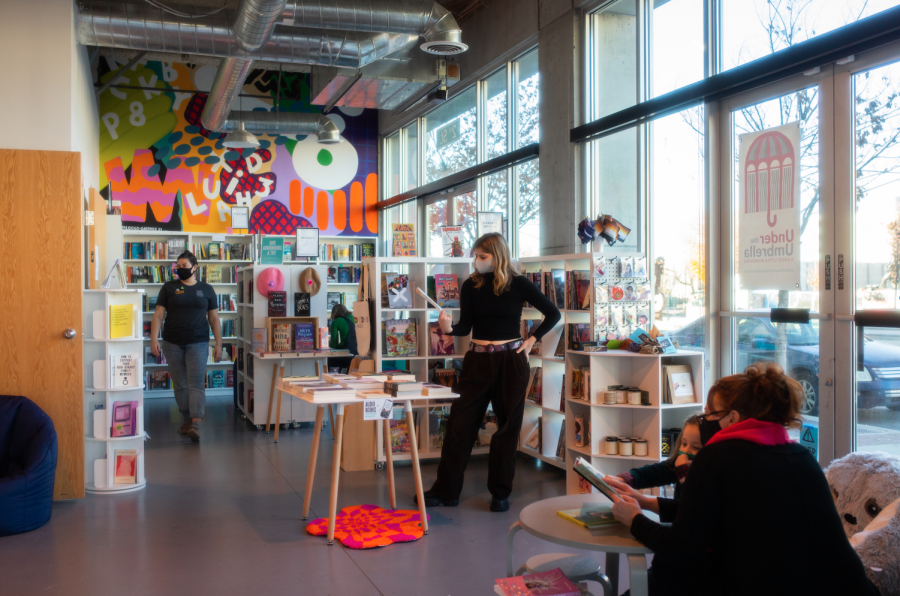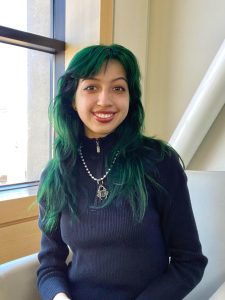Torres: We Need Queer Spaces More Than Ever
Kaitlyn Mahoney walks by customers at Under the Umbrella Bookstore in Salt Lake City on Nov. 28, 2021 (Photo by Emily Rincon | The Daily Utah Chronicle)
April 8, 2022
With the override of House Bill 11, trans girls are barred from playing sports. This legislation is harmful to everyone, and LGBTQ+ Utahns need community now more than ever. Building queer spaces in the face of blatant discrimination is essential to the resiliency of the LGBTQ+ community.
Queer spaces are a haven from the expectations of a heteronormative society and allow LGBTQ+ members to express themselves. Queer people in Utah experience mere tolerance or at worst hostility because of the LDS church’s stance on LGBTQ+ issues. As a queer woman growing up in Utah, I heard comments from my peers such as, “I’ll accept it but I just don’t approve of the lifestyle.” Utah’s culture of tolerating the existence of queer people isn’t enough. We need spaces that openly embrace and honor LGBTQ+ identities.
One such space is Under the Umbrella bookstore. They provide a closet of gender-affirming clothes you can donate to and take from. They also hold events such as open mics and display art by queer creators. Queer community hubs such as this are exactly what we need, but it is currently run by one person. It can be difficult to maintain such a critical community resource on your own. That can be emotionally, mentally and physically taxing on a person, especially if they feel like they owe it to the community to keep the space running.
Encircle is another organization that hosts queer community events. They hold Friendship Circles for members of the LGBTQ+ community to make friends and provide a limited number of free therapy sessions. They facilitate conversations between queer people and family members. But their care receives criticism because it doesn’t help the community’s most vulnerable. Forty-two percent of unhoused youth in Utah identify as LGBTQ+, yet Encircle Homes are not a place for LGBTQ+ people to seek shelter. Although access to therapy and safe social spaces is critical for this community, stable and safe housing takes priority for unhoused queer people. Regardless, the care they give is transformative for the families they serve.
The Utah Suicide Prevention Coalition cites lower levels of belonging and acceptance in the larger community as a key risk factor for suicide among the LGBTQ+ community. Queer youth in Utah are three times more likely to contemplate suicide in contrast to their heterosexual counterparts; queer adults are two times more likely and around 40% of trans adults attempt suicide. These devastating statistics prove just how important it is that we create and maintain queer community centers.
Queer spaces don’t have to be formal. It can be as simple as a group of LGBTQ+ friends. Ali Fitzgerald, a student at the University of Utah, expressed her love for the lack of pressure to define your identity: “It’s a whole spectrum, but being in a queer space validated that feeling.” When it comes to coming out and queer spaces, Kara Pike, a student at the U said about her experience, “It makes it easier to be who you are.”
The U’s LGBTQ+ resource center is a space for students. They hold Fab Fridays, a space for queer and trans students of color, along with events like Pride Week and Queer Conversations. Centers like these can help students find community and engage in conversations regarding their experiences. Trans students at the U have specific resources allocated to aid in finding accommodations. These resources help queer students be more open with their identity. Pike said, “The U has made it easier to find a community.”
Queer spaces are places of community engagement. Queer community centers have historically revolved around gay bars, such as the Stonewall Riots, the birthplace of the modern LGBTQ+ rights movement. More formal centers such as the Utah Pride Center have emerged as we have gained acceptance. The UPC works with various resources for the LGBTQ+ community including housing, legal aid, disability access and addiction recovery. They also hold rallies such as the most recent on March 24 to support trans youth in response to H.B. 11.
Places like Under the Umbrella also do their fair share of community engagement. They supply resources for the unsheltered and have a detailed anti-racist plan. They have a land acknowledgment and are active in their efforts to be accessible to disabled individuals. Most recently they held a sign-making night for the Trans Visibility March held March 31.
Queer community spaces are lifesaving. They provide key social connections and allow organizations for community engagement to create impactful change. Recent legislation has forced our state backward, but we will not relent. Queerness is resistance and we will resist the efforts to squash our community.
For trans peer crisis support, call the anonymous Trans Lifeline Hotline at (877) 565-8860.
For LGBTQ+ crisis counselors, call the anonymous Trevor Project Hotline at 1-866-488-7386, text “START” to 678-678 or visit their website.









jason • Apr 12, 2022 at 5:08 pm
What a SFB. Ever ready to please the left power crew–maybe teacher will put a star on her forehead. This whole article is nothing but virtue signalling trash.
e • Apr 20, 2022 at 1:34 pm
How does it feel to have a world that revolves around you and exclusively serves your interests? How does it feel to be loved and accepted for who you are without needing to fight for it? Just wondering.
Martine • Apr 12, 2022 at 4:59 pm
This article is so stupid. Kids who claim to have issues, like alleged suicidal thoughts, get to be trendy and popular with the kool teachers and teacher even gives them a star on the forehead. Time to get back to normal. Close down the racis and bigoted diversity/equity office at U of U. Award jobs based on qualifications.